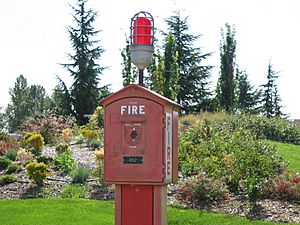Alarm device facts for kids

An alarm device is a tool that makes a sound, shows a light, or gives another type of signal. It warns people about a problem or something that needs quick attention. Think of it like a special messenger telling you to act fast!
Contents
What Does "Alarm" Mean?
The word alarm comes from an old French phrase, a l'arme. This meant "to the arms" or "to the weapons." It was a call for soldiers to grab their weapons and get ready. This happened if an enemy suddenly appeared.
The older word alarum was also used. It appeared many times in plays by William Shakespeare. It often meant sounds of a fight or trouble off-stage. Some think it was a bell or drum used to wake up soldiers.
How Alarms Have Changed Over Time
Early alarm devices were simple. People used bells, drums, or other loud instruments. Anything that made a lot of noise could get people's attention.
In the 1800s, police started using whistles. Steam whistles were also used on trains, ships, and in factories. They served as loud warning signals.
With the invention of electricity, new alarms appeared. These include buzzers, klaxons, and sirens. Flashing lights and different colored lights also became common.
Many buildings now have fire alarms. These can be small smoke detectors in homes. Or they can be big systems that automatically put out fires. Cars also have alarms to warn of danger.
Industries have rules for alarm devices. Red, blue, and amber colors are often used for alarms. Flashing lights usually mean something urgent is happening.
How People React to Alarms
How people react to an alarm can depend on many things. It might be how they grew up or what they learned. Seeing how others react also plays a part.
Because of this, it's good to test alarms regularly. Practicing what to do helps everyone respond correctly. This is why fire drills are so important.
Some alarms are made to be very loud or annoying. This is especially true for fire alarms. They want to make it hard for people to stay inside. This encourages everyone to leave the building quickly and safely.
Loud alarms can sometimes make people panic. This is called a "fight-or-flight response." A person might try to run away or deal with the danger. They might not think clearly in this state.
Understanding False Alarms
Sometimes, an alarm goes off when there's no real problem. This is called a "false alarm." It's like the story of The Boy Who Cried Wolf. If alarms go off too often for no reason, people might start to ignore them. This can be very dangerous if a real emergency happens.
False alarms can also waste important resources. For example, if a fire alarm goes off by mistake, firefighters rush to the scene. This means they might not be available for a real fire. It also puts them at risk as they drive quickly.
Many things can cause false alarms. For security alarms, pets moving around can set them off. Typing the wrong code can also trigger them. For fire alarms, cooking smoke or even aerosol sprays can cause a false alarm.
To avoid false alarms, place detectors carefully. A smoke detector should not be too close to the kitchen. This prevents steam or cooking smoke from setting it off. Some security systems also have a monitoring station. They check if an alarm is real before sending help.
Different Types of Alarm Devices
There are many kinds of alarm devices that help keep us safe or on schedule. Here are some common types:
- An alarm clock makes a sound at a set time. It helps people wake up or reminds them of an event.
- A fire alarm warns people in a building about a possible fire. This gives them time to get out safely.
- Warning devices on vehicles make sounds when a vehicle moves in an unexpected way, like backing up.
- Sirens, often with flashing lights, are on emergency vehicles. They warn others that the vehicle is rushing to an emergency.
Here are more types of alarm devices, grouped by what they do:
- burglar alarms warn of someone trying to break in. These often alert police without the burglar knowing. This helps catch them.
- distributed control systems (DCS) are in places like nuclear power plants. They create alarms to tell operators about important events they need to fix.
- Operation and maintenance (O&M) monitoring systems also have alarms. They tell an operator if a part of a system is not working right.
- Safety alarms go off if a dangerous situation happens.
- civil defense sirens are also called tornado sirens or air raid sirens. They warn communities of danger.
- fire alarm systems are common safety alarms.
- A smoke detector is a type of fire alarm that senses smoke.
- car alarms protect vehicles from theft or damage.
- personal alarms are small devices people carry for safety. They make a loud noise if the person feels threatened.
- Video alarm verification systems send instant alerts. They use video to check if a threat is real.
See also
 In Spanish: Dispositivo de alarma para niños
In Spanish: Dispositivo de alarma para niños
- Alarm management
- Warning system
- False alarm
- Physical security
- Security alarm
 | May Edward Chinn |
 | Rebecca Cole |
 | Alexa Canady |
 | Dorothy Lavinia Brown |


